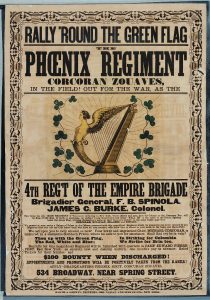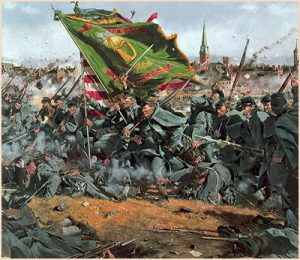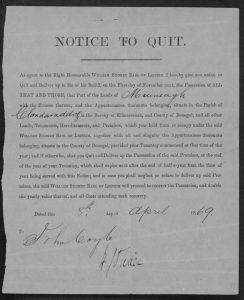
A month back, in my enthusiastic review of Claire Santry’s new book (which, by the way, is now seriously outselling my own on Amazon – D’Oh), I mentioned a record-set she highlighted that I was only vaguely familiar with, US Civil War widows’ pension applications.

I’ve now had a good root through them and they are truly extraordinary. Pensions were not just paid to widows, but to any dependents of those who died for the Union side in the US Civil War – elderly parents, those taking care of orphans, dependent siblings, anyone who could show that the death of the soldier had imposed financial suffering.
Why should they be especially useful for Irish research? Huge numbers of Irish emigrants fought in the War, by some estimates as many as served in the British Army in World War I. Most were Famine emigrants, some were post-Famine chain migrants and quite a few were recruited in Ireland specifically to fight. They all died in their tens of thousands.

Getting a pension wasn’t easy. The Army Veterans Administration was the mother of all bureaucracies and the hoops to be jumped through were mind-boggling, with files ranging up 200 pages and decisions often taking more than a decade. Which is good news for researchers. Marriages, births, service histories, dependent relationships – all had to be authenticated, usually by multiple sources, giving precise dates and places, and often with eyewitness affidavits from friends and neighbours.
Because almost all the soldiers were first-generation emigrants, many claimants were actually still in Ireland and many of the marriages and births reported are Irish, in some cases reaching as far back as the early decades of the nineteenth century. This is particularly useful because large numbers of emigrants left from Western counties – Donegal, Mayo, Sligo, Galway – for which few early parish registers exist. I’ve already come across a marriage in Achonry parish in 1828, with townland addresses. That’s four decades before the start of the surviving Achonry registers.

The files are even more useful for fleshing out family stories. Take the case of Unice and John Coyle, living in the townland of Muineagh in Clondavaddog, Donegal, parents of Hugh Coyle who died on June 24 1864 in Andersonville prisoner-of-war camp. Their application went through the US Consul in Derry and included letters from Unice giving painful detail of their circumstances and health, even attaching an original ‘Notice to Quit’ from the notorious Lord Leitrim. They got $8 a month. God bless America.
The only online access to the files is on fold3.com, a site set up by Ancestry.com and, unsurprisingly, not covered by an Ancestry.com subscription. At least they’ve taken the chance to rethink the ridiculously clunky Ancestry search interface. Fold3’s is clean, intuitive and fast, making it simple, for example, to pick out all files that mention a particular Irish county.
For a detailed case history using the files to reconstruct the social history of Cruit Island in Donegal, see Damian Sheil’s excellent blog. Damian has also done maps of the locations mentioned in the files for Britain and mainland Europe, but not for Ireland.
Hmm. There’s an idea.

Yes government bureaucracy and genealogical success go hand in hand. I have utilized the pension files to identify marriages that are other difficult or impossible to find. I found one where the widow had to file an affidavit from her sister because the church was destroyed before her application in the 1890s. This verified the date of marriage and that the widow had a sister that also lived to adulthood and her married name. Another reason to use them is finding when he enlisted and hopefully the question of what County, State the soldier was born in will be filled in with an Irish county mentality. My collateral relative listed he was born in County Sligo in 1876 enlistment papers to go fight in the Indian Wars. The pensions aren’t just helpful for the Civil War but all US conflicts.
The (American) Civil War pension files are invaluable for Irish research but Fold3 has barely scratched the surface of those that exist. It’s worthwhile to keep checking or to apply directly to the US National Archives, assuming one has a name and other info for the soldier. Also, with an Ancestry subscription, you can get half-price for a Fold3 subscription–but you have to ask, surprise. The city directories on Fold3 are the most useful part of Fold3 for my Irish research–tracking them between censuses, finding nearby relatives et al.
My great-grandfather, James Quinlan of the 13th NY Heavy Artillery, contracted malaria down South during the war tho he died years later. His wife, Sarah, applied for a pension. It was denied and she battled for over five years til she got it via the testimony of men James served with. The wealth of data–bmd’s, names of relatives and friends etc–in her pension file, was vital in doing the near-impossible–finding the townland of origin for both James and Sarah when I did not even know a county. James Quinlan of Clifford, Castletownroche, County Cork and Sarah Herrick of Knockbarron, Eglish and Drumcullen, County Kings (Offaly). PS–Sarah got $8 per month plus $2 for each child under age 15. This file is not yet on Fold3 but I’m glad you brought this critical resource to people’s attention.
As ever, a most informative blog! The pension files are a terrific resource.
Damian Sheils has indeed mapped Irish locations too. These can be seen at http://irishamericancivilwar.com/2014/05/31/visualising-the-impact-of-the-american-civil-war-in-ireland-with-palladio/
For the later pensions, c. 1900, applicants had to prove age. They did that by providing a copy of their baptism attested by the parish priest in Ireland or by requesting copies of the family page in the 1841 census. These records have not yet been digitized but are available from the US National Archives.
Actually – Fold3 (formerly Footnote.com) was not set up by Ancestry but was ACQUIRED by Ancestry.
https://digitalmediawire.com/2010/09/23/ancestry-com-acquires-footnote-com-parent-iarchives-for-27m/
While I have no direct interest in the civil war pensions, the work being done by Damian Shiels is ground-breaking and should be on the required reading list for anyone who had Irish ancestors or relatives serving in the US Civil war.